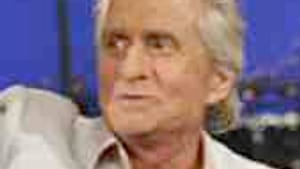Stay in the Loop
BSR publishes on a weekly schedule, with an email newsletter every Wednesday and Thursday morning. There’s no paywall, and subscribing is always free.
Me, Mike and a certain cancer
My cancer could be prevented

I'm navigating my way through cancer land, and the news story that's playing like a sound track for my little adventure is the accounting of the cancer of Michael Douglas, the actor. Like me, Michael has head and neck cancer-Stage 4 and, according to the stories, he— like me— has an 80% chance of surviving it.
His story and mine have some other parallels. We're the same age, same gender, same ethnicity, we both have adoring and beautiful life partners, and we both seem to have enjoyed a pretty good time so far.
Sure, I missed out on the fame, fortune and Hollywood part. And (poor Mike) he probably never crossed the ocean in a sailboat, taught culinary school in Italy or saw the Dodgers play at Ebbets Field. Six o' one, I say— no reason for him to feel jealous. We're both getting great care and neither of us is entitled to rail against cruel fate.
One other thing we have in common: Both of us trooped in and out of doctors' offices with a set of symptoms for a long time before anybody said, "Hey, that's cancer!"
I'll bet Mike had the earaches and the sore throats. Maybe he even found himself spitting up bits of blood from time to time. Chances are that someone snaked a tube down his nose too and looked around and didn't see the cancer that was growing there. Didn't see it until it became a dome-light flashing Stage 4 blocking traffic in the middle of his life.
Faulty diagnosis
So, here are some puzzling things about this whole business, some questions that I think Mike and I might both want to get answered:
"¢ What makes this cancer so hard to see? Is there anything Mike or I could have done? Is there some chance that the doctors who missed this diagnosis could give some thought to what went wrong? What can all of us do now to help make this mistake less likely for other people?
"¢ That 80% survival rate is important. It suggests that both of us have cancers that started with a human papilloma virus infection— a sexually transmitted condition. (Regular squamous cell cancer of the head and neck has a lower survival rate).
HPV by itself doesn't necessarily lead to cancer. In most people it's harmless: The body fights off the infection, and the virus becomes inactive. Certain HPV strains lead to warts— annoying but not malignant. Other HPV strains are deemed "high-risk" because they occasionally develop into a persistent infection that can progress to cervical cancer in women, and head and neck cancer in men.
It turns out that HPV is one of the few cancers that can be prevented with a vaccine. Right: a vaccine. Like the ones for mumps and chicken pox.
Ask the doctor
Should Mike and I make a big deal out of this? Should we use our star-power to tell the world that there's a cancer that's preventable with a vaccine? That we got it, but you don't have to? Should we mention that these HPV cancers could be stamped out in a generation?
Maybe Mike and I should take this little moment to suggest that anyone with children ask their doctor about Cervarix and Gardasil, the two vaccines that are proven to prevent HPV when they're given before a person becomes sexually active. We could do a commercial together (although I might have to coach Michael how to say his lines).
"¢ One other thing: if each of us has an 80% chance of making it, then there's a 64% chance that we'll both make it. When we do Mike, I'll buy you a drink.
In the interest of full disclosure: Although the opinions expressed and faulty thinking promulgated here are entirely the author's, Our Lady of the Sick Co-incidence has fixed it so that the author has a close personal relative employed by a major vaccine manufacturer.♦
Lynn Hoffman navigates his way through cancer at www.radiationdays.com.
His story and mine have some other parallels. We're the same age, same gender, same ethnicity, we both have adoring and beautiful life partners, and we both seem to have enjoyed a pretty good time so far.
Sure, I missed out on the fame, fortune and Hollywood part. And (poor Mike) he probably never crossed the ocean in a sailboat, taught culinary school in Italy or saw the Dodgers play at Ebbets Field. Six o' one, I say— no reason for him to feel jealous. We're both getting great care and neither of us is entitled to rail against cruel fate.
One other thing we have in common: Both of us trooped in and out of doctors' offices with a set of symptoms for a long time before anybody said, "Hey, that's cancer!"
I'll bet Mike had the earaches and the sore throats. Maybe he even found himself spitting up bits of blood from time to time. Chances are that someone snaked a tube down his nose too and looked around and didn't see the cancer that was growing there. Didn't see it until it became a dome-light flashing Stage 4 blocking traffic in the middle of his life.
Faulty diagnosis
So, here are some puzzling things about this whole business, some questions that I think Mike and I might both want to get answered:
"¢ What makes this cancer so hard to see? Is there anything Mike or I could have done? Is there some chance that the doctors who missed this diagnosis could give some thought to what went wrong? What can all of us do now to help make this mistake less likely for other people?
"¢ That 80% survival rate is important. It suggests that both of us have cancers that started with a human papilloma virus infection— a sexually transmitted condition. (Regular squamous cell cancer of the head and neck has a lower survival rate).
HPV by itself doesn't necessarily lead to cancer. In most people it's harmless: The body fights off the infection, and the virus becomes inactive. Certain HPV strains lead to warts— annoying but not malignant. Other HPV strains are deemed "high-risk" because they occasionally develop into a persistent infection that can progress to cervical cancer in women, and head and neck cancer in men.
It turns out that HPV is one of the few cancers that can be prevented with a vaccine. Right: a vaccine. Like the ones for mumps and chicken pox.
Ask the doctor
Should Mike and I make a big deal out of this? Should we use our star-power to tell the world that there's a cancer that's preventable with a vaccine? That we got it, but you don't have to? Should we mention that these HPV cancers could be stamped out in a generation?
Maybe Mike and I should take this little moment to suggest that anyone with children ask their doctor about Cervarix and Gardasil, the two vaccines that are proven to prevent HPV when they're given before a person becomes sexually active. We could do a commercial together (although I might have to coach Michael how to say his lines).
"¢ One other thing: if each of us has an 80% chance of making it, then there's a 64% chance that we'll both make it. When we do Mike, I'll buy you a drink.
In the interest of full disclosure: Although the opinions expressed and faulty thinking promulgated here are entirely the author's, Our Lady of the Sick Co-incidence has fixed it so that the author has a close personal relative employed by a major vaccine manufacturer.♦
Lynn Hoffman navigates his way through cancer at www.radiationdays.com.
Sign up for our newsletter
All of the week's new articles, all in one place. Sign up for the free weekly BSR newsletters, and don't miss a conversation.

 Lynn Hoffman
Lynn Hoffman